October Theater Guide: Dancing into Autumn, and Much More
- Like
- Digg
- Del
- Tumblr
- VKontakte
- Buffer
- Love This
- Odnoklassniki
- Meneame
- Blogger
- Amazon
- Yahoo Mail
- Gmail
- AOL
- Newsvine
- HackerNews
- Evernote
- MySpace
- Mail.ru
- Viadeo
- Line
- Comments
- Yummly
- SMS
- Viber
- Telegram
- Subscribe
- Skype
- Facebook Messenger
- Kakao
- LiveJournal
- Yammer
- Edgar
- Fintel
- Mix
- Instapaper
- Copy Link

Siovhan Christensen (L) and Daina Michelle Griffith play the eerie, unnamed women in Quantum Theatre’s “The River.” But don’t be overly spooked: theater on tap this month includes shows that span a rich variety of moods and genres.
Pittsburgh’s live theater schedule is so large and full in October that we must (a) resist the cheap urge to call it a “bountiful harvest,” and (b) apologize for not previewing absolutely everything that will play.
What accounts for this, um, exceptional plenitude of theater? As usual, nearly all the major resident companies are back in action by now. Plus, there is an unusual number of notable touring shows and special one-off productions.
One theme that predominates this month is dance. Two superstar modern dance companies come to town—the Martha Graham and the Bill T. Jones / Arnie Zane Company—while Pittsburgh Ballet Theatre presents Giselle, and Attack Theatre and Texture Contemporary Ballet bring out new works of their own.
Musical theater includes The Fantasticks, The Who’s Tommy, Finding Neverland, and (since opera is musical theater, isn’t it?), Pittsburgh Opera’s production of La Traviata. The special one-of-a-kinds are chilling. They include BASETRACK Live, the acclaimed multimedia show about U.S veterans of the Afghanistan war, and a double feature that combines Diary of a Madman with Poe’s Last Night.
And let us not forget plain old good theater! We have an eye-opening array of contemporary plays: Yankee Tavern (a dark comedy / suspense play about conspiracy theories), Lynn Nottage’s Intimate Apparel, Robert Askins’ shockingly intimate Hand to God, and Jez Butterworth’s The River (presented by Quantum Theatre, ‘nuff said). For a revived classic, try The Playboy of the Western World.
Scan below for the shows that interest you, keeping in mind they’re all previewed in order of run dates.
HAND TO GOD by Robert Askins. Now through Oct. 22, City Theatre.
Plays with puppets in them are not just for children, and some are not for small children at all. Hand to God, a dark comedy by Robert Askins, is set in a Texas town where a church has started a faith-based puppet club for teenagers. Things literally get out of hand when an evil hand puppet takes on a life of its own—spewing foul obscenities, oozing lust and rebellion, and otherwise acting out (one suspects) the repressed impulses of the shy teenaged boy who made him. Hand to God was a smash hit off-Broadway, then moved last year to Broadway, where it was nominated for five Tony Awards. Here in Pittsburgh, City Theatre opens its season with the play. 1300 Bingham St., South Side.
I’M GONNA PRAY FOR YOU SO HARD by Halley Feiffer. Sept. 29 – Oct. 16, The REP at Pittsburgh Playhouse.
Playwright Halley Feiffer is the daughter of a near-legendary man. Her father Jules Feiffer (still alive and kickin’ at age 87) has won a Pulitzer Prize, Academy Award, and Obie Award for his work as cartoonist, screenwriter, and author. So it may be no coincidence that young Halley—who also acts—has written a play about an actress with a famous, domineering dad. One must hope that real-life papa Jules isn’t as savagely wacko as the father in I’m Gonna Pray for You So Hard. The play is said to be amusing but frightening—when it opened in New York last year, some audience members fled their seats in alarm—and it has a surprise twist at the end. The REP, Point Park U’s professional company, is staging Feiffer’s father-daughter smashup in the Studio Theatre at Pittsburgh Playhouse. 222 Craft Ave., Oakland.
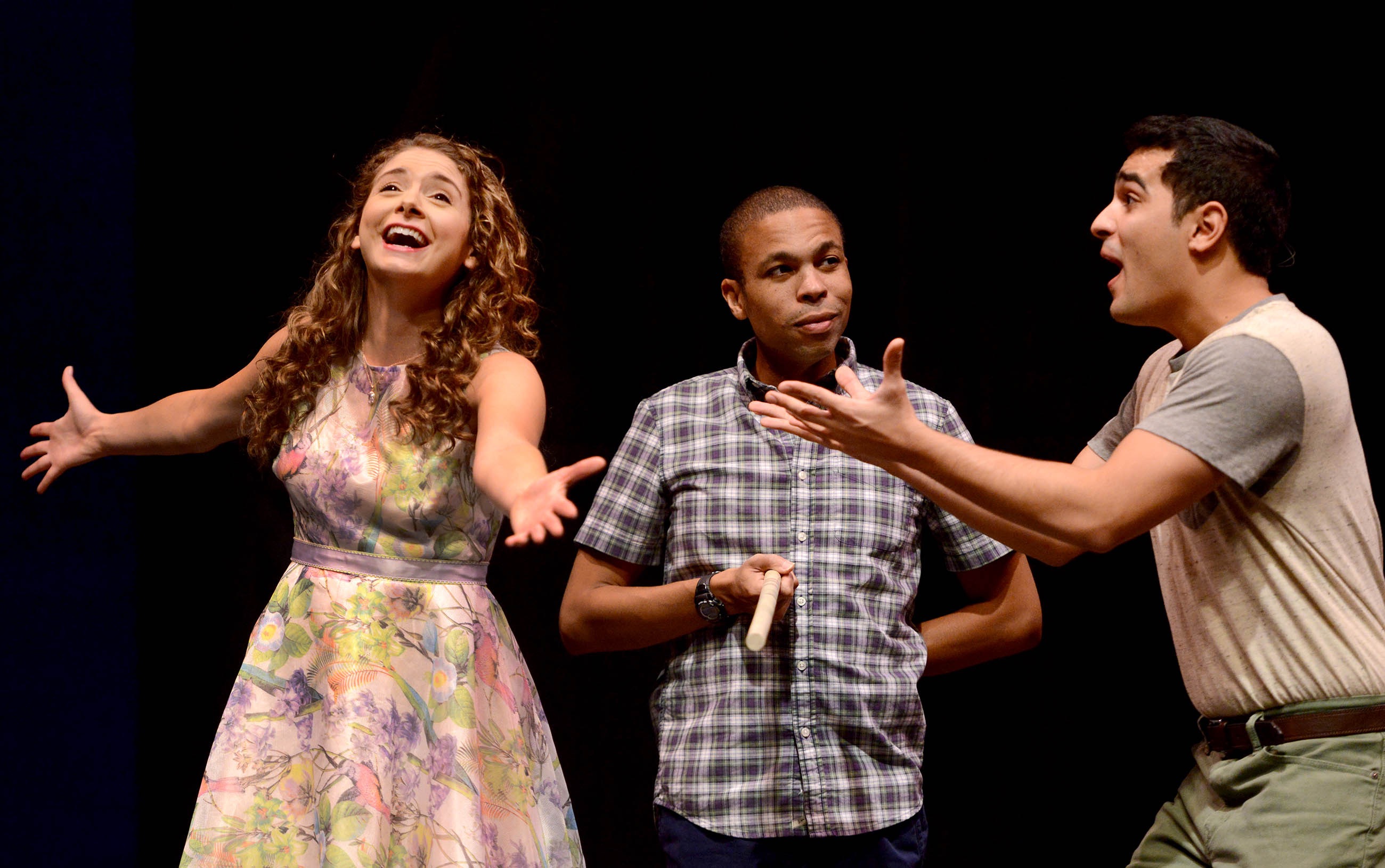
So simple and yet so puzzling: Jason Shavers (center) says it all with a look while Mary Elizabeth Drake and Jamen Nanthakumar expound in “The Fantasticks.”
THE FANTASTICKS (musical) by Tom Jones and Harvey Schmidt. Sept. 29 – Oct. 30, Pittsburgh Public Theater.
The longest-running musical in the history of show business is not Phantom of the Opera, which holds the Broadway record at nearly 12,000 performances and still counting. It’s a modestly scaled off-Broadway musical. The Fantasticks opened there in 1960 and finished its initial run in 2002, after 17,162 performances. Part of the show’s charm is its mixture of simplicity and surreal strangeness. Using only a few actors and rudimentary stage props, The Fantasticks conjures a bizarre tale. Two neighboring dads come up with a surefire scheme to make their children fall in love: they forbid the young man and woman to have any contact. Then, as surreptitious romance blooms, the fathers hire a man to pretend to kidnap the girl so the lad can “rescue” her—a move that brings unexpected consequences. The show also mixes haunting music (as in the song “Try to Remember”) with wry humor, and Pittsburgh Public Theater has chosen The Fantasticks to launch its 2016-17 season. See our review. At the O’Reilly Theater, 621 Penn Ave., Cultural District.
IMPULSE (modern ballet). Sept. 30 – Oct. 2, Texture Contemporary Ballet.
Texture Contemporary Ballet, a company that performs exactly what its name says, is putting forth a slate of original works under the title Impulse. As in all Texture shows, the dances are grounded in traditional ballet techniques but adapted and enhanced in new ways. Impulse features a ballet set to recorded songs by Adele, and another accompanied by a live singer. Also in keeping with Texture’s practice, the schedule includes a special (and usually condensed) performance for children at 4 p.m. on Saturday, Oct. 1. Grown-ups are welcome at all performances. New Hazlett Theater, 6 Allegheny Square East, North Side.
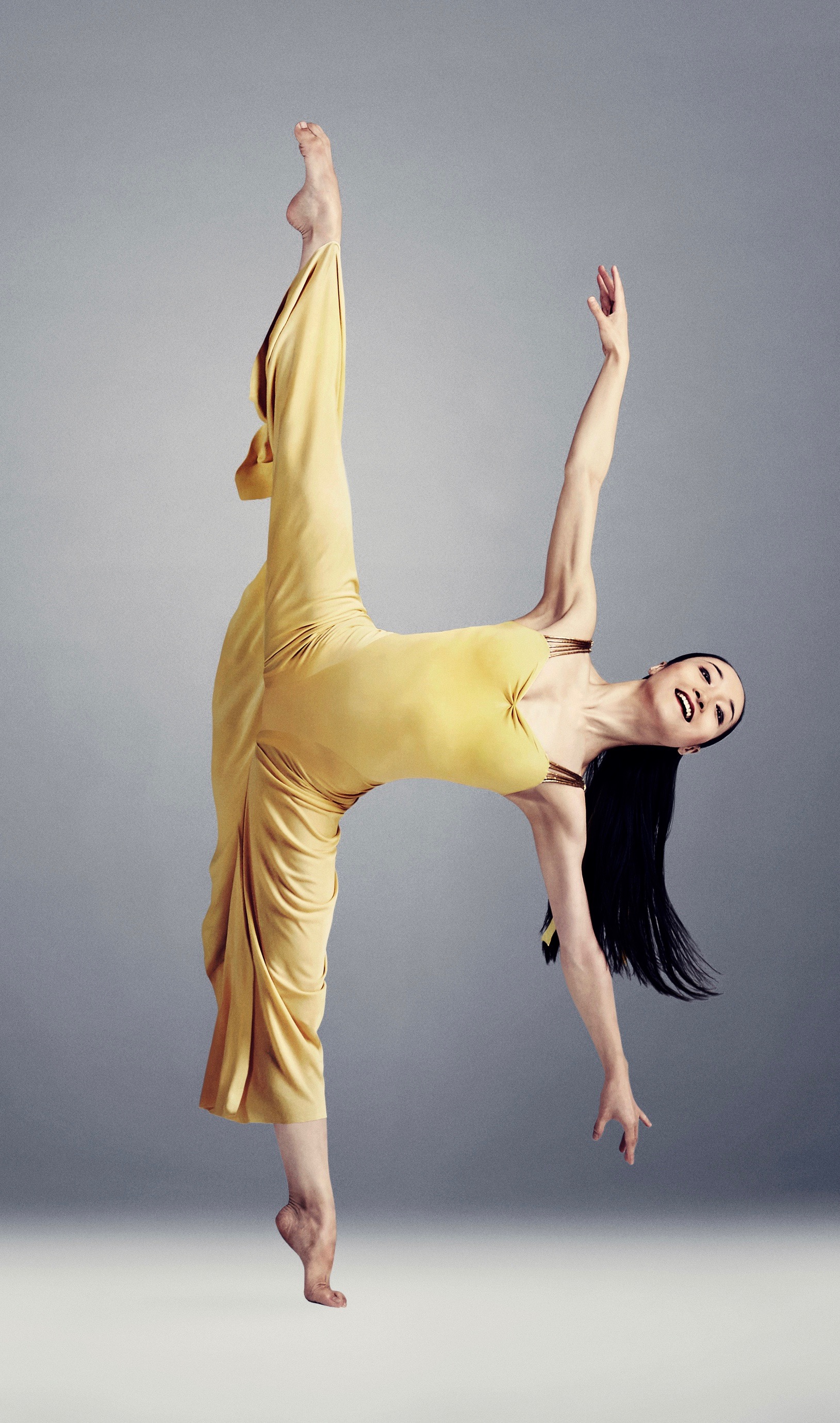
Girlz rule: the Martha Graham Dance Company was originally all women, and the repertoire still features plenty of star turns for dancers like Xiaochuan Xie, shown here in “Diversion of Angels.”
MARTHA GRAHAM DANCE COMPANY (modern dance). Oct. 1 only, presented by Pittsburgh Dance Council.
Strange but true: the oldest surviving dance company in this country is a modern dance company. Although ballet is quite old, for centuries it was based mainly in Europe, and thus the grandmother of all U.S. troupes is the vastly influential Martha Graham Dance Company, founded in New York in 1926. And when the company’s current dancers visit town with a show that combines old and new works, they are bringing Graham’s legacy back to where she began. Martha Graham was born in Allegheny (now Pittsburgh’s North Side) in 1894 and spent most of her childhood here, moving with the family to California at age 10.
New forms of artistic dance were emerging in those years, led by dancers tied neither to ballet nor to musical theater. Graham as a young adult learned from two now-legendary pioneers of the movement, Ruth St. Denis and Ted Shawn, then set out to create on her own. She developed a visceral, sensual approach to dance that remained distinctive while it borrowed from sources ranging from American Indian dance to honky-tonk rag. Graham lived long and fruitfully. She danced until she was 75 and kept choreographing until her death at 96, in 1991. Her company’s Pittsburgh program—presented by Pittsburgh Dance Council—includes two classic Graham pieces plus a contemporary sequel to her “Lamentation,” and a new piece by Swedish choreographer Pontus Lindberg. 8 p.m. Byham Theater, 101 6th St., Cultural District.
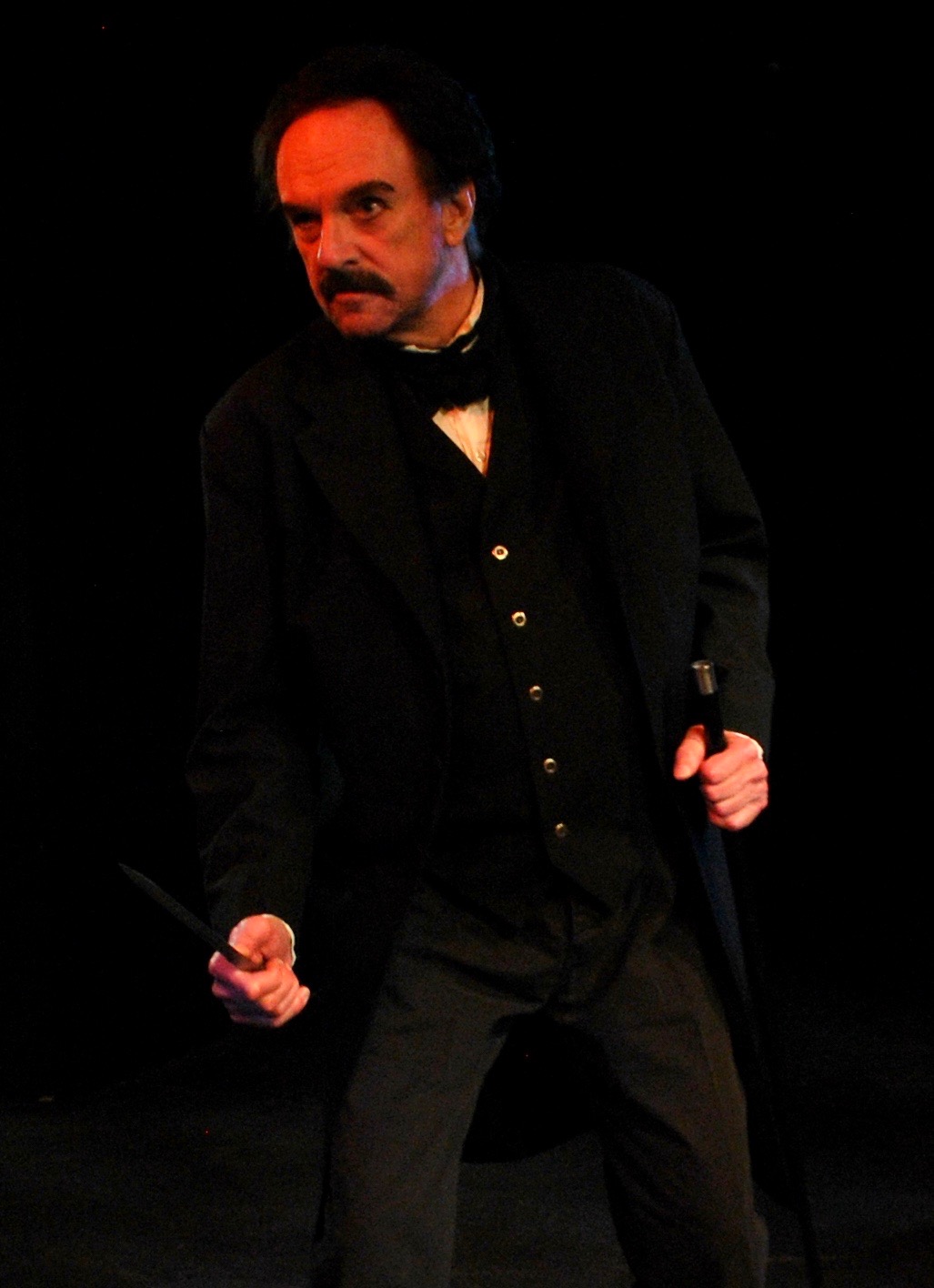
David Crawford is an earnest and soon-to-be-dead Poe.
DIARY OF A MADMAN and POE’S LAST NIGHT (two solo plays). Oct. 5-16, Metropolis Theater.
Two veteran actors with Pittsburgh roots have teamed up to present an intriguing, and spooky, double bill. Each has a one-man play that he has performed elsewhere to rave reviews, so they are pairing them on the New Hazlett stage. Carnegie Mellon alumnus Jon Hayden performs Diary of a Madman, adapted from Nikolai Gogol’s bizarre story of an office clerk who gradually—and sometimes hilariously—reveals himself to be quite mad. Pittsburgh-based David Crawford counters with Poe’s Last Night, a speculative reenactment of the mysterious death of Edgar Allan Poe. (Poe was found in a delirium, dressed for an unknown reason in clothes that were not his, and didn’t recover. Crawford’s play adds poetry to the mystery by having the dying man speak passages from his works, including “The Raven.”) Diary of a Madman was a hit in Atlanta and Poe’s Last Night drew crowds at the Edinburgh Fringe. They come together at the New Hazlett Theater, 6 Allegheny Square East, North Side.
THE PLAYBOY OF THE WESTERN WORLD by John Millington Synge. Oct. 6-15, Carnegie Mellon School of Drama.
Irony, folks, irony. The Playboy of the Western World may sound like a high-society comedy of manners, but this landmark Irish play set off riots when it premiered in 1907, and it’s a working-class satire full of wicked twists. One night in rural County Mayo, a handsome young stranger stumbles into a small town’s pub. He says he’s been on the run from the family farm, where, in a fit of passion, he killed his old dad by smiting him with a spade. The first twist is that the renegade becomes a hero to the townspeople—including to the young women, who see his dire deed as an act of daring and are charmed by his gift of gab. Further twists follow when it turns out the deed did not go down as he had described. Dublin theater fans were outraged. They felt playwright John Millington Synge had painted an insulting picture of Irish commoners (and it didn’t help that Synge, though Irish himself, was an upper-class Protestant). But The Playboy of the Western World has endured, with audiences worldwide finding it a multi-leveled lampoon that speaks to many times and cultures. Carnegie Mellon’s School of Drama is performing the play to open its 2016-17 mainstage season. In the Philip Chosky Theater on the Carnegie Mellon campus, 5000 Forbes Ave., Oakland.
INTIMATE APPAREL by Lynn Nottage. Oct. 6-16, Pitt Theatre Arts.
When Lynn Nottage first made her mark in theater, it was a mark that often had niches specified. She was hailed as an up-and-coming female playwright, a promising African-American playwright, and, not surprisingly, a writer of plays about black women. Now, after a Pulitzer Prize and other high honors, it’s time to just call her one of our leading playwrights. Pitt’s Department of Theatre Arts is performing the Nottage play Intimate Apparel, regarded by many fans as perhaps her best. Set in New York in the early 1900s, Intimate Apparel traces the story of a seamstress who makes fashionable undergarments for ladies who can pay. Her clients run the gamut from wealthy white women to a prostitute. The men in her life include a friendly (but ultimately verboten to her) Jewish dry-goods dealer and a hard-driving construction worker intent on marriage. What unfolds is a panorama of life, hopes, and limitations in the big city during a formative time. In the Henry Heymann Theatre at the Stephen Foster Memorial, 4301 Forbes Ave., Oakland.
SOME ASSEMBLY REQUIRED (multimedia dance/performance/improv) by Attack Theatre. Oct. 7-9 at Miller Gallery.
Attack Theatre is a Pittsburgh dance company dedicated to doing the unexpected. In our present anything-goes age when genre-busting multimedia arts have conditioned audiences to expect the unexpected, that’s a challenging task, but Attack Theatre keeps attacking it and has performed worldwide. Last season the company worked with physicists to build a dance piece in which the laws of physics illustrated the dynamics of human relationships. Now the dancers and musicians are performing in Carnegie Mellon’s Regina Miller Gallery, a space that exhibits experimental genre-busting visual arts. The piece is called Some Assembly Required because it is audience-interactive and to some degree improvised. Translation: we don’t know what the heck they are going to do, which means once again, mission accomplished. The surest bet is that it will be worth seeing. In the Miller Gallery on the Carnegie Mellon campus, 5000 Forbes Ave., Oakland.
THE RIVER by Jez Butterworth. Oct. 7-30, Quantum Theatre.
Quantum Theatre has pulled off some surprising feats over the past few years—such as turning one of Shakespeare’s lesser-known plays, The Winter’s Tale, into an astounding, psychedelic comic opera. Now the company is going after another potential sleeper hit with Jez Butterworth’s The River. Butterworth is a highly regarded English playwright, so there’s no question of author cred here. But whereas his previous play, the 2008 Jerusalem, was a raucous blockbuster that won several big awards, The River is a smaller, intimate drama that has drawn what you might call perplexed praise from reviewers. The male character is a mysterious and reclusive trout fisherman (played on Broadway two years ago by Hugh Jackman). Two women round out the cast. The fisherman is prone to philosophical musings upon his pastime, but apparently he’s up to something more. The nature of it cannot be revealed because the play comes bristling with spoiler alerts. Quantum is staging The River on the shore of a river that must be revealed: it’s the Allegheny. At Aspinwall Riverfront Park, 285 River Ave., Aspinwall.
LA TRAVIATA (opera) by Giuseppe Verdi. Oct. 8-16, Pittsburgh Opera.
Opera seasons should open resoundingly, and Pittsburgh Opera answers the call by staging an acclaimed chandelier-shaker and tear-jerker, La Traviata. This Verdi masterpiece takes off with the famous “Brindisi” (“Drinking Song”) at an all-night party, soars into a blossoming love story, shatters amid scenes of conflict and misunderstanding, and ends tragically. Who could ask for more? La Traviata has become one of the world’s most-performed operas since its 1853 premiere in Venice. The story will be familiar to readers of classical romantic novels as it is based on The Lady of the Camellias, a.k.a. Camille, by Alexandre Dumas the younger. Verdi’s librettist for La Traviata was Francesco Maria Piave. In the roles of the ill-fated lovers, Pittsburgh Opera has cast a suitably dashing pair: soprano Danielle Pastin as Violetta and tenor Cody Austin as Alfredo. Benedum Center, 237 7th St., Cultural District.
BASETRACK LIVE (multimedia documentary) by En Garde Arts. Oct. 13 only, touring production at the Byham Theater.
Most theater is fiction, or at least heavily fictionalized. BASETRACK Live is all too true. This “multimedia documentary”—a mixture of acting, music, film, and projected photos—conveys the experiences of U.S. soldiers in Afghanistan and their struggles to adapt to home life afterward. BASETRACK Live started from an independent journalism project to record and compile the soldiers’ stories. The New York theater company En Garde Arts then worked the material into a feature-length performance. The show premiered at Brooklyn Academy of Music in 2014 and now has been put on the road. It’s said to be powerful; it has touches of the grim humor that war veterans are familiar with; and a variety of voices are calling BASETRACK Live a must-see. 7 p.m. Byham Theater, 101 6th St., Cultural District.
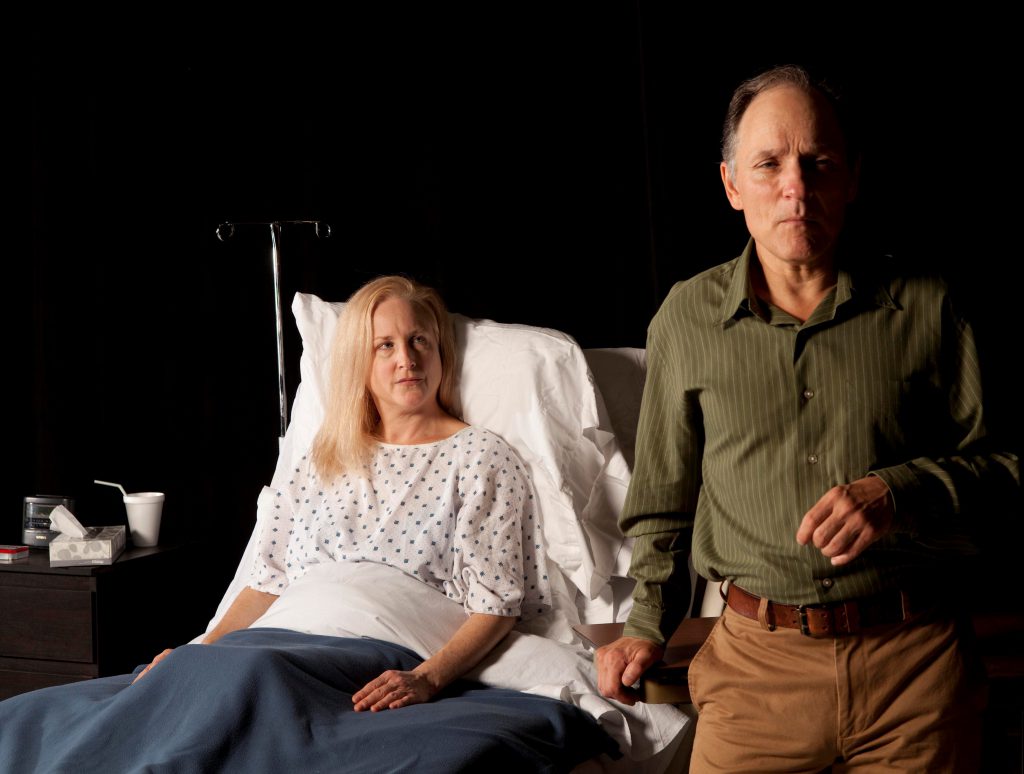
In Off The Wall’s “An Accident” Amy Landis is recovering from critical injuries she sustained after being run over by driver Kenneth Bolden who is now visiting her in the hospital.
AN ACCIDENT by Lydia Stryk. October 14-29, off the Wall productions
off the WALL productions opens their 2016-17 10th anniversary season with An Accident, written by Lydia Stryk. Loaded with cynical humor, it has an intense story line involving recovery, guilt, and forgiveness. The central character—Libby—was run over and critically injured in an accident with an auto. The vehicle was driven by Anton, who after the accident appears at her bedside. Now the two must confront and overcome a myriad of emotions, some old and some new, that arise in the aftermath of the accident. Will the two of them rise above the calamity to find better days? Drive very carefully to off the WALL and see. For mature audiences only. Carnegie Stage, 25 W. Main St., Carnegie.
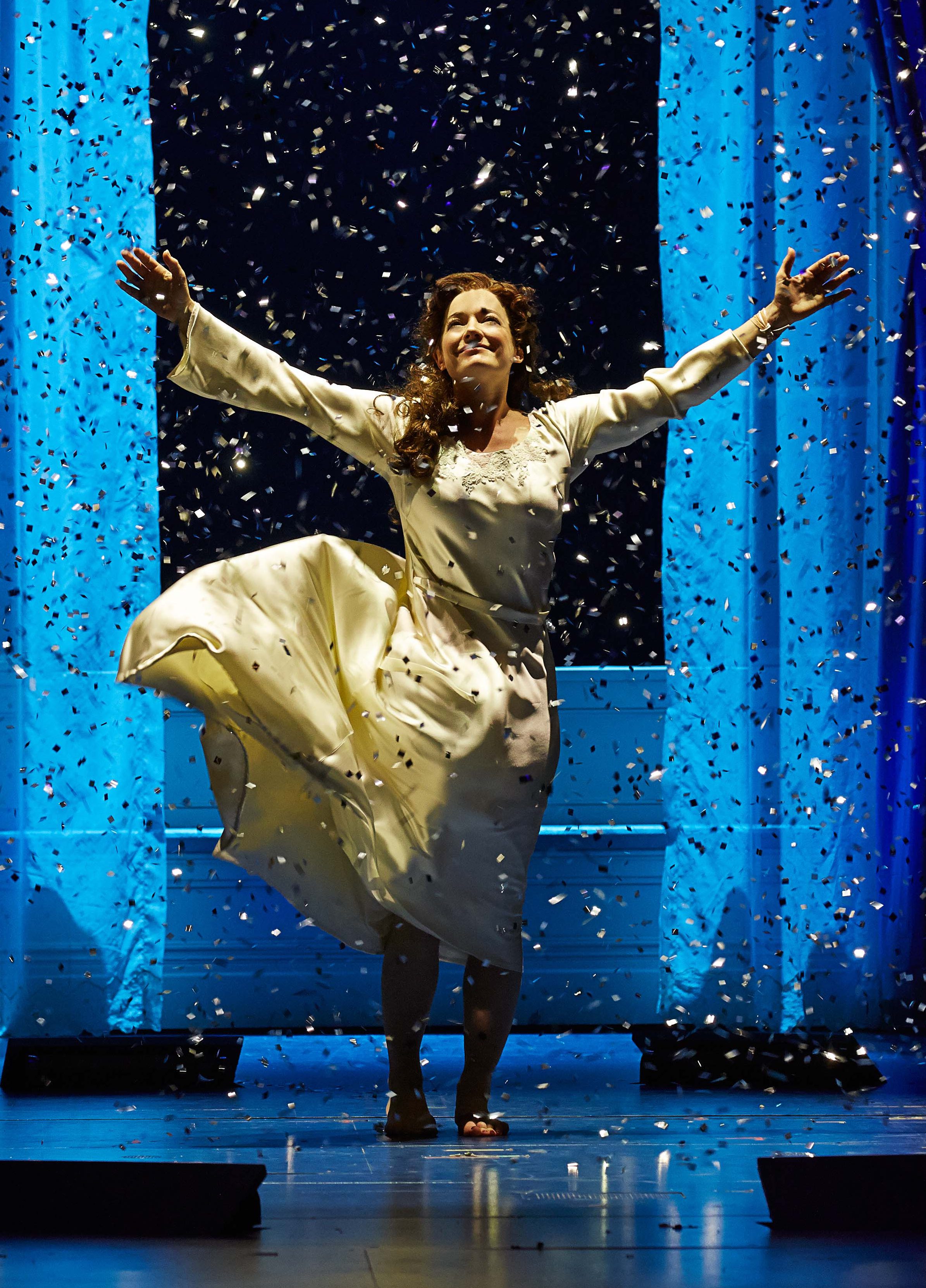
In “Finding Neverland,” it is Peter’s real-life mom who flies off to the bye and bye. (This pic is from the Broadway production with Laura Michelle Kelly in the role.)
FINDING NEVERLAND (musical) by Gary Barlow, Eliot Kennedy, and James Graham. Oct. 18-23, national touring company at the Benedum Center.
Many adult males are accused of having a Peter Pan complex: they don’t want to grow up. That phenomenon, combined with the long-running popularity of the Peter Pan story itself, may help explain why attention has been focused on Peter Pan’s creator, the Scottish writer Sir James Matthew Barrie. The 2004 biopic Finding Neverland starred Johnny Depp (no comment!) as Barrie. And more recently, after a back-and-forth process involving British and American creative teams, a stage musical of the same title appeared. The musical Finding Neverland, like the movie, relates the moving true story of Barrie’s friendship with the Llewelyn Davies family, whose sons—including one named Peter—inspired the fictional Peter and his flight crew. The musical finished a 17-month Broadway run this summer, just as a national touring company was rehearsing its hearty song-and-dance numbers. After opening in Buffalo (where else to take wing?), the road-show ensemble will bring Finding Neverland to Pittsburgh for the enjoyment of audiences of all ages and maturity levels. Benedum Center, 237 7th St., Cultural District.
Analogy / Dora: Tramontane (modern dance & performance) by the Bill T. Jones / Arnie Zane Company. Oct. 21-22, presented by Pittsburgh Dance Council.
Bill T. Jones would be known as a spellbinding storyteller if not for the fact that his medium is modern dance. Often in his award-winning career, Jones has created dance pieces mixed with words. He might just talk out a tale while dancing solo, or choreograph big ensemble numbers with spoken narratives running through them. Pittsburghers can experience the latter when the Bill T. Jones / Arnie Zane Company visits to perform its latest feature-length piece, Analogy / Dora: Tramontane. In certain parts of Europe, “Tramontane” is the name for a fierce north wind that, according to superstition, can drive people insane. Jones has based this dance on a true story of an ill wind that blew disaster far and wide. His mother-in-law, Dora Amelan, is a French Jew who survived the Holocaust—much of the time while working as a nurse in horrific Nazi internment camps. Analogy / Dora: Tramontane includes recorded interviews with Amelan (now in her nineties) along with re-enacted scenes in which members of the company speak and dance. At the August Wilson Center, 980 Liberty Ave., Cultural District.
THE WHO’S TOMMY (rock musical) by Pete Townshend et al. Oct. 21-30, Point Park Conservatory.
Nearly everyone has heard the song. The question is, do you know the story behind the deaf, dumb, and blind kid who sure plays a mean pinball? Point Park University’s Conservatory Theatre Company will provide it with a full-up rendition of The Who’s Tommy. The multi-Tony-winning rock musical, derived from the 1969 concept album by The Who, also delivers a lot of high-energy song and dance that you can’t get by streaming the album tracks. Point Park Conservatory students have earned a reputation for top-notch musical theater, and though their budget may not permit staging that’s quite as extravagant as in the above clip from a London production, they will bring the heat. The Who’s Tommy is in the Rockwell Theatre at Pittsburgh Playhouse, 222 Craft Ave., Oakland.
GISELLE (ballet) by Jean Coralli and Jules Perrot. Oct. 28-30, Pittsburgh Ballet Theatre.
Return with us now to the heart of the mythical Rhineland, where noblemen and hunters court beautiful peasant girls while dark spirits haunt the woods! Yes, Pittsburgh Ballet Theatre is returning to the stage with a season-opener performance of the classic Giselle. The ballet holds an honored status in the history of dance. Choreographed by French dancers Jean Coralli and Jules Perrot—with a libretto co-written by the poet and author Théophile Gautier, and musical score by Adolphe Adam—Giselle enthralled Paris audiences when it opened in 1841. It also typified the tone of many of the century’s romantic ballets, in part by blending realism with the supernatural. (When Giselle, the peasant girl of the title, dies after being fought over by two suitors, she is inducted into a ghostly clan of spirit-maidens who resolve to wreak vengeance on the men.) PBT has billed the ballet as “hauntingly beautiful” and will back the dancers with new sets and stage effects that accentuate the haunting music. Benedum Center, 237 7th St., Cultural District.
YANKEE TAVERN by Steven Dietz. Oct. 28 – Nov. 5, Throughline Theatre.
Whether you believe conspiracy theories or mock them, you may want to catch Throughline Theatre’s production of Yankee Tavern. The seriocomic play is set in a fictional bar near Manhattan’s Ground Zero. It’s a bar where the power went out on the morning of 9/11, stopping the jukebox in the middle of Don McLean’s “American Pie”—and where the patrons, long after the tragic event, include a hardcore conspiracy theorist who does not believe any conspiracy theories about John F. Kennedy’s assassination. He says there’s a conspiracy that invented those theories in order to make people mistrust the government. Yankee Tavern contains many bits of mind-bending silliness, which have drawn big laughs when performed in other cities. But in fact, the facts are not always what they seem to be, and the play eventually ventures into the far more mind-bending territory where reality and fantasy become hard to tell apart. At the Grey Box Theatre, 3595 Butler St., Lawrenceville.
THE TOXIC AVENGER (musical) by Joe DiPietro and David Bryan. Through Dec. 18, Pittsburgh CLO Cabaret.
For those who enjoy mutations, a cult horror-comedy movie from 1984 has been turned into a stage musical. The Toxic Avenger tells the story of a pollution-fighting nerd named Melvin Ferd the Third who is transformed to a slimy superhero after being soaked in toxic waste. Using his newfound superpowers, mutant Melvin wins the love of a blind librarian, and together they wage war on the nefarious characters responsible for corrupting the environment. The musical, which premiered off-Broadway in 2009, has a rock score with songs like “All Men Are Freaks” and “Who Will Save New Jersey?” Pittsburgh CLO is performing The Toxic Avenger in the friendly confines of the Cabaret at Theater Square.
Photo credits: The River, by Heather Mull. The Fantasticks, courtesy of Pittsburgh Public Theater. Martha Graham Dance Company, by Hibbard Nash Photography. David Crawford as Poe, by Eric Smith. Finding Neverland, © Carol Rosegg, An Accident by Heather Mull.
Mike Vargo, a Pittsburgh-based freelance writer and editor, covers theater for Entertainment Central.
Share on Social Media
- Like
- Digg
- Del
- Tumblr
- VKontakte
- Buffer
- Love This
- Odnoklassniki
- Meneame
- Blogger
- Amazon
- Yahoo Mail
- Gmail
- AOL
- Newsvine
- HackerNews
- Evernote
- MySpace
- Mail.ru
- Viadeo
- Line
- Comments
- Yummly
- SMS
- Viber
- Telegram
- Subscribe
- Skype
- Facebook Messenger
- Kakao
- LiveJournal
- Yammer
- Edgar
- Fintel
- Mix
- Instapaper
- Copy Link
Follow Entertainment Central
Sign up for the EC Newsletter
Latest Stories







